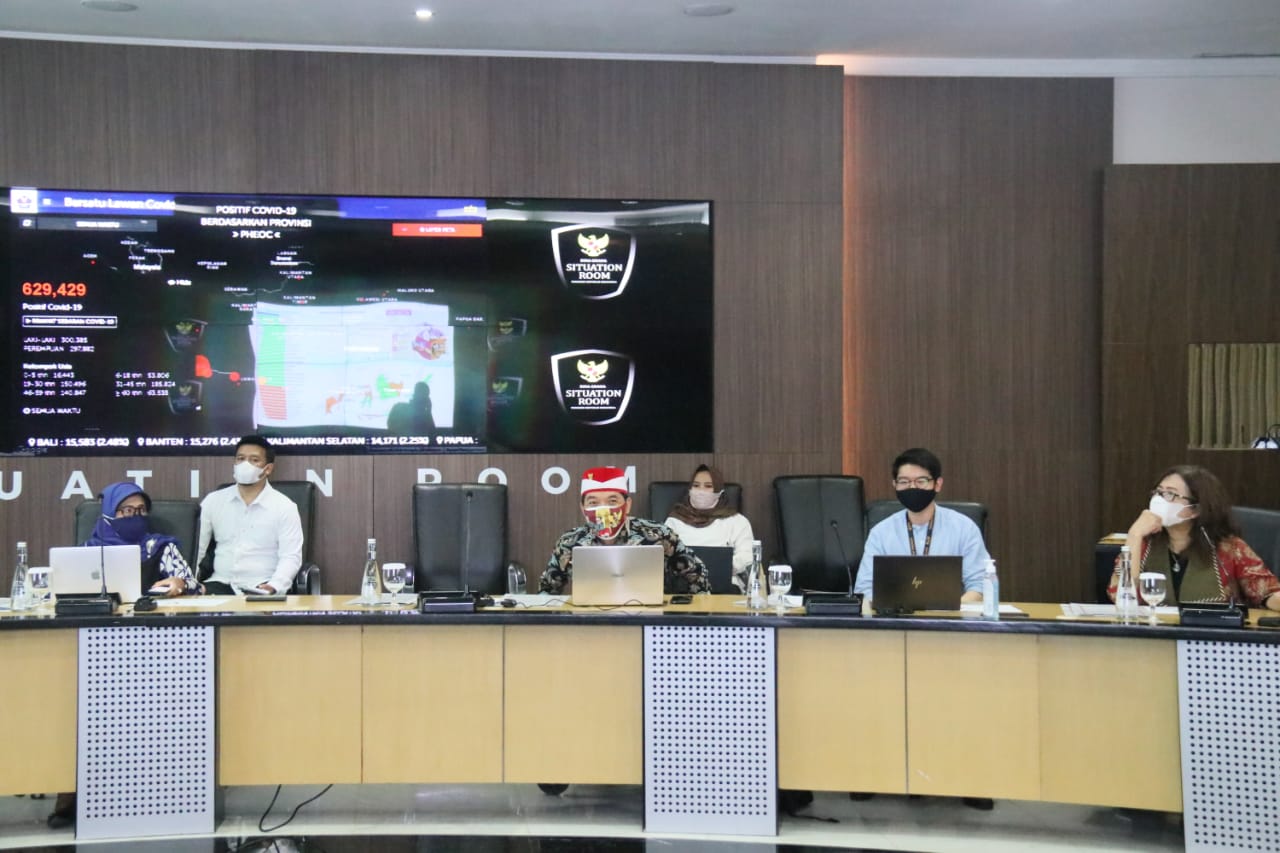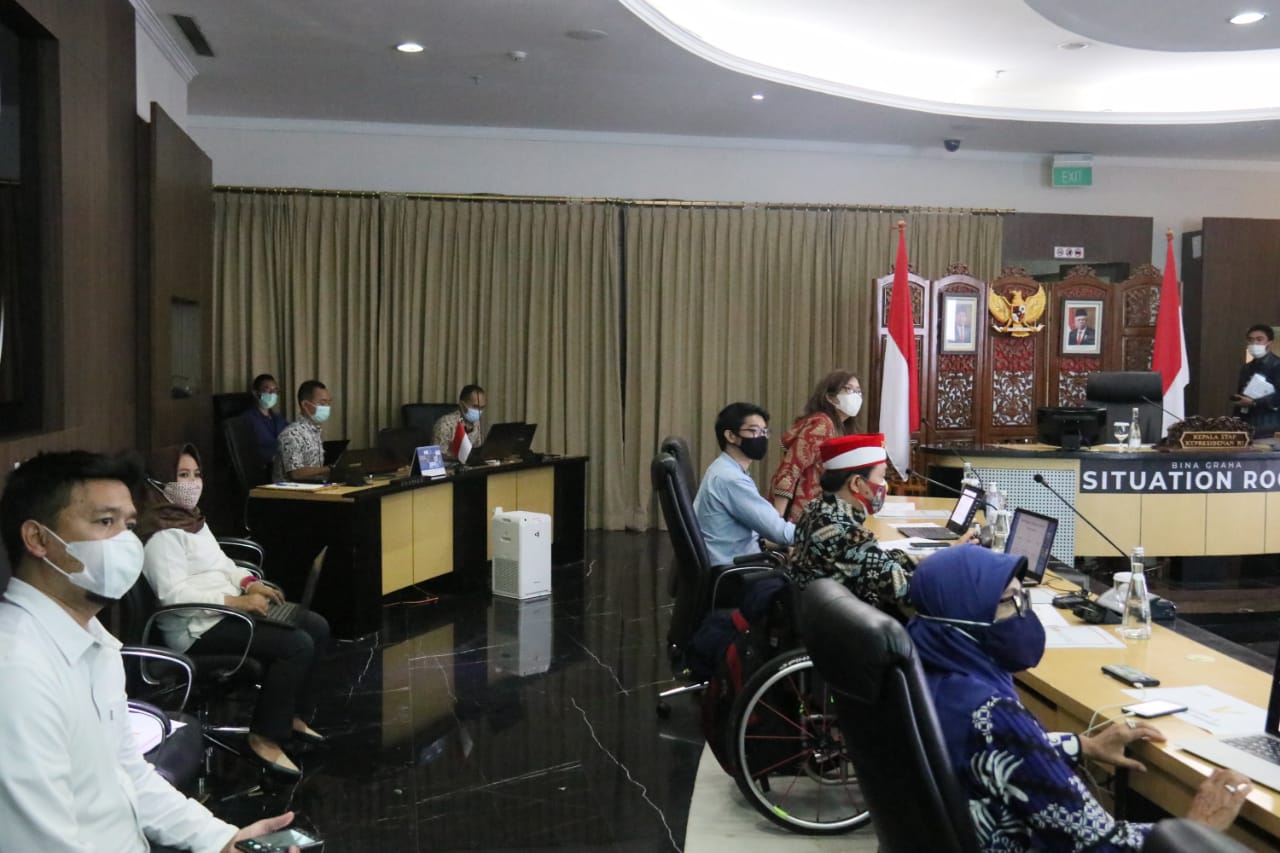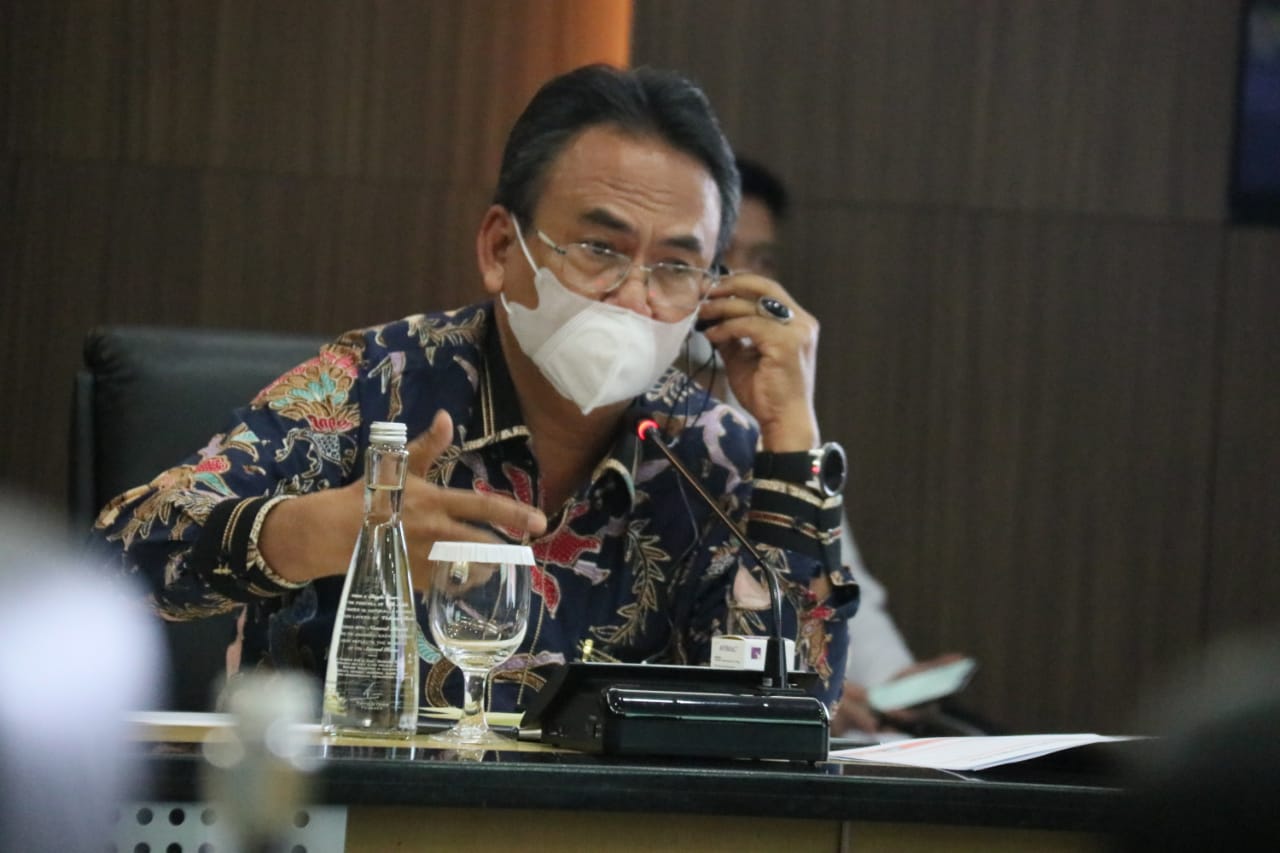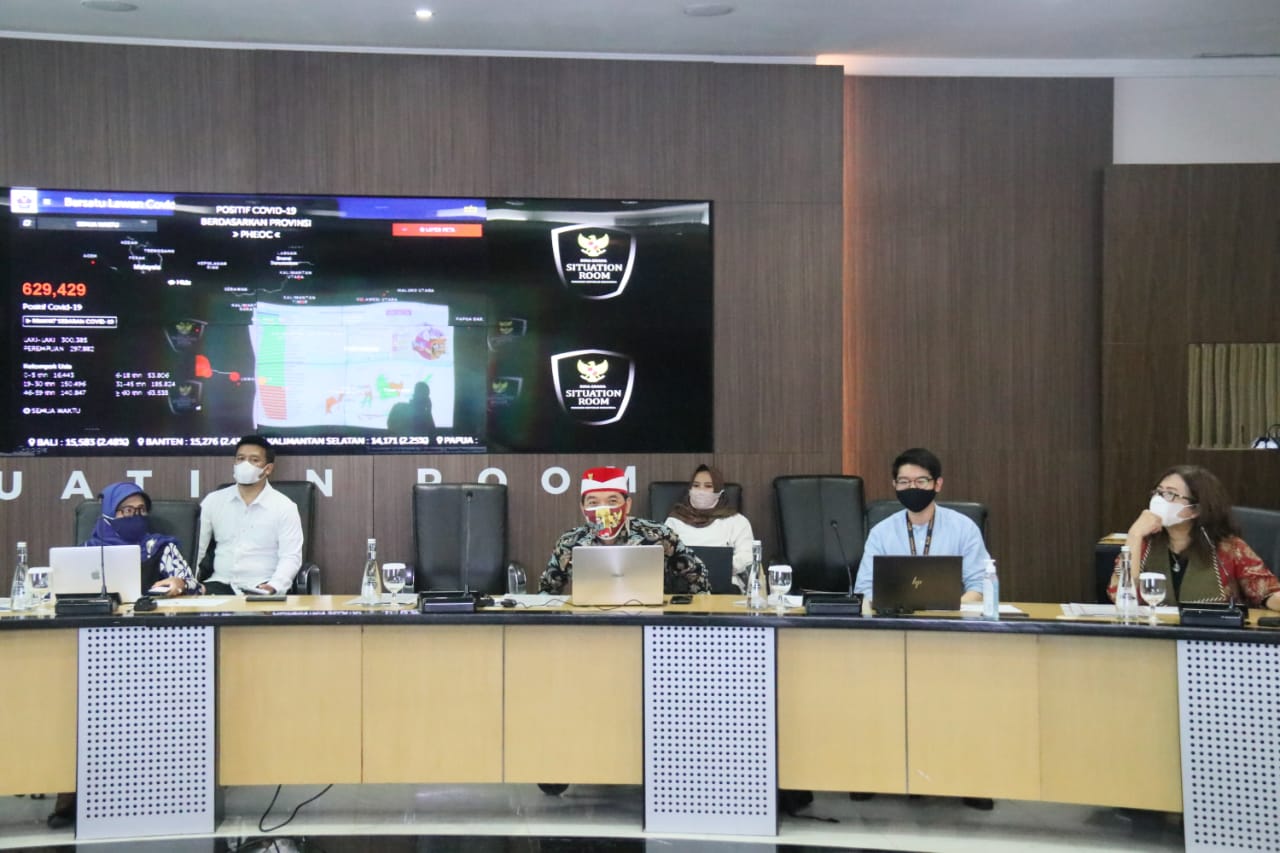Writer :
Humas Ditjen Rehabilitasi Sosial
Editor :
Annisa YH
Translator :
Intan Qonita N
JAKARTA (December 16, 2020) - In accordance with the mandate of Law Number 8 of 2016 concerning Persons with Disabilities, article 131 states that in the context of respecting, protecting and fulfilling the rights of persons with disabilities, the National Commission for Disabilities (KND) was formed as an independent non-structural institution.
KND has the task of carrying out monitoring, evaluation, advocacy for the implementation of Respect, Protection and Fulfillment of the Rights of Persons with Disabilities. KND is a form of national implementation and monitoring of the Convention of The Right of Persons With Disabilities (CRPD).
Starting the consultation discussion on the acceleration of the formation of the KND after the judicial review of Presidential Regulation No. 68 of 2020, the Chief of Presidential Staff of the Republic of Indonesia, Moeldoko said that this discussion was carried out to find the best formulation of the formation of the KND in line with the start of the technical process of forming the KND after the issuance of Presidential Regulation No. 68 of 2020 concerning National Commission for Disabilities.
The Presidential Staff Office (KSP) also wants to ensure that the implementation of Presidential Regulation Number 68 of 2020 concerning KND is in accordance with international level principles. Therefore, KSP together with Ministries/Institutions conducted consultations with Michael Ashley Stein, an expert on International Disability Law and one of the formulators of the CRPD.
Michael revealed that KND has a separate identity from the government, so KND must be independent even though funding comes from the government.
The state also needs to do things that are in line with the CRPD, especially in article 33 regarding national implementation and supervision. Inter-ministerial coordination also needs to be pursued in the implementation of the CRPD.
The key, continued Michael, is that KND must work well and in line with the government in implementing the CRPD.
KND has the task of carrying out monitoring, evaluation, advocacy for the implementation of Respect, Protection and Fulfillment of the Rights of Persons with Disabilities. KND is a form of national implementation and monitoring of the Convention of The Right of Persons With Disabilities (CRPD).
Starting the consultation discussion on the acceleration of the formation of the KND after the judicial review of Presidential Regulation No. 68 of 2020, the Chief of Presidential Staff of the Republic of Indonesia, Moeldoko said that this discussion was carried out to find the best formulation of the formation of the KND in line with the start of the technical process of forming the KND after the issuance of Presidential Regulation No. 68 of 2020 concerning National Commission for Disabilities.
The Presidential Staff Office (KSP) also wants to ensure that the implementation of Presidential Regulation Number 68 of 2020 concerning KND is in accordance with international level principles. Therefore, KSP together with Ministries/Institutions conducted consultations with Michael Ashley Stein, an expert on International Disability Law and one of the formulators of the CRPD.
Michael revealed that KND has a separate identity from the government, so KND must be independent even though funding comes from the government.
The state also needs to do things that are in line with the CRPD, especially in article 33 regarding national implementation and supervision. Inter-ministerial coordination also needs to be pursued in the implementation of the CRPD.
The key, continued Michael, is that KND must work well and in line with the government in implementing the CRPD.
In line with this, the Director General of Social Rehabilitation of the Ministry of Social Affairs of the Republic of Indonesia, Harry Hikmat explained that by ratifying the CRPD, Indonesia established the focal point stated in Law no. 8 of 2016 concerning Persons with Disabilities, namely the Ministry of Social Affairs. "This focal point does not mean being the sole implementer, but serves to ensure the coordination mechanism between sectors," he explained.
Harry also said that in CRPD article 33 paragraph 2 the context is based on the legal and administrative system, the State is encouraged to establish a framework, one or more independent mechanisms, as needed to promote, protect and oversee the implementation of the CRPD. "So what is formed is a framework, not an organization," said Harry.
It is necessary to pay attention to, continued Harry, in Article 33 paragraph 3 of the CRPD which states that civil society, especially persons with disabilities and the organizations that represent them, must be fully included and participate in the supervision process. "To ensure the supervision system referred to in Article 33 of the CRPD, Indonesia has agreed to establish a KND," he said.
Currently, Presidential Regulation Number 68 of 2020 concerning the National Commission for Disabilities (KND) has passed a judicial review by the Supreme Court, so that the government, in this case the Ministry of Social Affairs, is obliged to implement the Presidential Regulation.
Harry also reported that an open selection committee had been formed to fill the position of KND Commissioner. The formation of this committee is the result of consultations between the Minister of Social Affairs with the President of the Republic of Indonesia and various parties including the Coordinating Minister for Human Development and Culture (Menko PMK).
The open selection committee was chaired by Harry Hikmat and consisted of Harkristuti Harkrisnowo who is known as an academician, Angkie Yudistia from professionals and people with hearing and speech disabilities, Sinta Nuriyah Wahid as community leaders and people with physical disabilities, and Siswadi, a practitioner and person with a physical disability.
"We work seriously and intensively to ensure that the selection process is transparent, objective and really pays attention to the aspirations of people with disabilities," concluded Harry.
Risnawati Utami, member of the CRPD Committee representing Indonesia, said that the state has an obligation to respect, protect and fulfill the rights of persons with disabilities. "It is important that we refer back to the obligations of the state, one of which is the monitoring mechanism for the implementation of the CRPD," he said. He advised that this meaningful consultation discussion must of course continue to involve friends with disabilities.
This discussion involved the relevant Ministries/Institutions, namely the Coordinating Ministry for Human Development and Culture, the Ministry of Law and Human Rights, the Ministry of Administrative and Bureaucratic Reform and Organizations of Persons with Disabilities, both in person and through video conferences.
Harry also said that in CRPD article 33 paragraph 2 the context is based on the legal and administrative system, the State is encouraged to establish a framework, one or more independent mechanisms, as needed to promote, protect and oversee the implementation of the CRPD. "So what is formed is a framework, not an organization," said Harry.
It is necessary to pay attention to, continued Harry, in Article 33 paragraph 3 of the CRPD which states that civil society, especially persons with disabilities and the organizations that represent them, must be fully included and participate in the supervision process. "To ensure the supervision system referred to in Article 33 of the CRPD, Indonesia has agreed to establish a KND," he said.
Currently, Presidential Regulation Number 68 of 2020 concerning the National Commission for Disabilities (KND) has passed a judicial review by the Supreme Court, so that the government, in this case the Ministry of Social Affairs, is obliged to implement the Presidential Regulation.
Harry also reported that an open selection committee had been formed to fill the position of KND Commissioner. The formation of this committee is the result of consultations between the Minister of Social Affairs with the President of the Republic of Indonesia and various parties including the Coordinating Minister for Human Development and Culture (Menko PMK).
The open selection committee was chaired by Harry Hikmat and consisted of Harkristuti Harkrisnowo who is known as an academician, Angkie Yudistia from professionals and people with hearing and speech disabilities, Sinta Nuriyah Wahid as community leaders and people with physical disabilities, and Siswadi, a practitioner and person with a physical disability.
"We work seriously and intensively to ensure that the selection process is transparent, objective and really pays attention to the aspirations of people with disabilities," concluded Harry.
Risnawati Utami, member of the CRPD Committee representing Indonesia, said that the state has an obligation to respect, protect and fulfill the rights of persons with disabilities. "It is important that we refer back to the obligations of the state, one of which is the monitoring mechanism for the implementation of the CRPD," he said. He advised that this meaningful consultation discussion must of course continue to involve friends with disabilities.
This discussion involved the relevant Ministries/Institutions, namely the Coordinating Ministry for Human Development and Culture, the Ministry of Law and Human Rights, the Ministry of Administrative and Bureaucratic Reform and Organizations of Persons with Disabilities, both in person and through video conferences.
Share :
 English
English
 Bahasa
Bahasa




